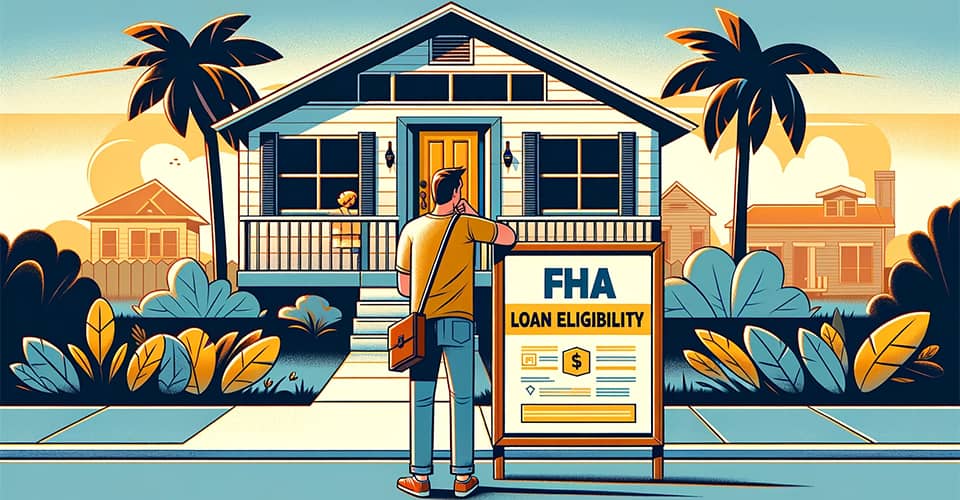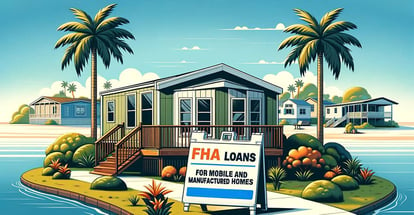What Are the Eligibility Requirements for FHA Loans in Florida?
In this article, we'll explore the nuts and bolts of FHA loans in Florida, from the minimum credit score and down payment requirements to other important criteria.
Credit Score
The credit score is critical in determining your Florida FHA loan eligibility. Unlike conventional loans, FHA loans are more accessible to those with lower credit scores, making them a preferred option for many first-time homebuyers or individuals rebuilding their credit.
In Florida, you generally need a minimum credit score 580 to qualify for an FHA loan. This threshold allows you to take advantage of the low down payment option of as little as 3.5%.
It's worth noting that this is significantly lower than the requirements for most conventional loans, which typically require a credit score of 620 or higher.
What If Your Credit Score Is Below 580?
Don't lose hope if your credit score falls below 580. You can still qualify for an FHA loan, but the down payment requirement may be higher. A down payment of 10% of the home's purchase price is usually required in such cases.
If your credit score is below the minimum requirement, consider improving it before applying for an FHA loan. This can include paying down outstanding debts, avoiding new credit applications, and ensuring all your bills are paid on time. Improving your credit score increases your chances of approval and can result in more favorable loan terms.

Down Payment
For FHA loans in Florida, the standard down payment requirement is 3.5% of the home’s purchase price, provided you have a credit score of at least 580. This is significantly lower than many conventional loans, which often require a 20% down payment.
The lower down payment threshold makes FHA loans an attractive option for many buyers, particularly those who may not have substantial savings.
If your credit score is between 500 and 579, you're not out of the running for an FHA loan, but you will need to make a larger down payment - typically 10% of the purchase price. This higher requirement is due to the increased risk associated with lower credit scores.
One of the appealing features of FHA loans is the flexibility in funding your down payment. FHA guidelines allow the entire down payment to come from gift funds, provided they are from an acceptable source, like a family member. This can significantly ease the burden for buyers with difficulty saving for a down payment.
It's important to note that all FHA loans in Florida require mortgage insurance, regardless of the down payment amount. However, the size of your down payment can influence the cost of this insurance. A larger down payment reduces the loan-to-value ratio, which can lower the cost of the mortgage insurance premium.
FHA Loan Limits
The loan size or limit is a critical aspect of FHA loans in Florida, dictating the maximum amount you can borrow. Understanding these limits is essential, as it influences the range of homes you can consider and plays a significant role in your financial planning.
As of 2023, FHA loan limits in Florida differ from one county to another. In areas with lower housing costs, the limit for a single-family home may be at the national FHA floor, while in high-cost areas, the limit can go up to the national FHA ceiling. It's important to check the specific limits for the county where you intend to purchase a home.
The loan limit directly affects the type of property you can buy with an FHA loan. Suppose you're looking at homes priced above the FHA loan limit for your county. In that case, you'll need to negotiate the price, find a different property, or consider alternative financing options.
If the home you're interested in exceeds the FHA loan limit, you might need to explore other mortgage options, such as a conventional loan, which typically has higher limits. Alternatively, you might consider making a higher down payment to bring the loan amount within the FHA limit.
Debt-to-Income (DTI) Ratio
DTI ratio is the percentage of your gross monthly income that goes towards paying debts. It includes monthly debt payments such as credit card bills, student loans, car loans, and projected mortgage payments. The DTI ratio is divided into Front-End DTI and Back-End DTI.
-
Front-end DTI is the percentage of your income that would go towards housing costs, including the mortgage payment, property taxes, homeowners insurance, and homeowners association fees, if applicable.
- Back-end DTI includes all debt obligations, not just housing costs.
For FHA loans in Florida, the preferred maximum Front-End DTI ratio is typically around 31%, while the Back-End DTI ratio is usually capped at 43%.
However, it's important to note that these are not absolute limits. FHA loans can be approved with a higher DTI ratio in certain cases.
Borrowers with a higher DTI ratio can still qualify for an FHA loan, especially if they have compensating factors such as a higher credit score or substantial savings. Sometimes, FHA lenders may accept DTI ratios as high as 50% with strong compensating factors.
Calculating Your DTI Ratio
To calculate your DTI ratio, add all your monthly debt payments and divide the total by your gross monthly income (income before taxes).
For example, if your monthly debts amount to $1,500 and your gross monthly income is $4,500, your DTI ratio is 33% ($1,500 / $4,500 = 0.33).
A lower DTI ratio is favorable as it indicates a balanced debt-to-income proportion, enhancing your appeal to lenders. It can lead to better loan terms and lower interest rates.
Before applying for an FHA loan, lowering your DTI ratio by paying down debts and increasing your income, if possible, is advisable.
Home Inspection
The home inspection is a vital step in the FHA loan process in Florida. It involves thoroughly examining a property to ensure it meets specific safety, security, and soundness standards set by the Federal Housing Administration (FHA). This process protects the borrower and safeguards the FHA's interest in the property.
The primary goal of the FHA home inspection is to identify any major issues that might compromise the livability or safety of the property. It covers a wide range of elements, from the structural integrity of the building to its mechanical systems.
An FHA-approved inspector will assess various aspects of the property, including:
-
Structural soundness: The foundation, floors, and walls must be secure and significant damage-free.
-
Roofing: The roof should be in good condition, without leaks, and expected to last at least a few more years.
-
Electrical and plumbing systems: These should be in safe, working order.
-
Heating and cooling systems must be functional and adequate for the home.
-
Hazardous materials: The inspector checks for lead-based paint, asbestos, or other hazardous substances.
- Pest inspection: Checking for termites or other pest infestations is crucial, especially in Florida's climate.
Difference Between Home Inspection and Appraisal
It's important to distinguish between a home inspection and an appraisal. An appraisal is a valuation of the property's worth, while an inspection is a detailed look at the property's condition. FHA loans require both an appraisal and an inspection.
Who Pays for the Home Inspection?
Typically, the potential homebuyer is responsible for the home inspection cost. It's a worthwhile investment, as it can reveal issues that might require significant expenditure in the future.
If the inspection uncovers problems, it doesn't necessarily mean the end of your FHA loan journey. Some issues might need to be resolved before the loan can be approved, while others might be negotiable between the buyer and seller.
Income Requirements
The FHA requires borrowers to have a steady and reliable income. This means having a consistent work history, typically for the last two years.
Lenders will examine your employment history, salary, overtime, bonuses, commission, and other forms of income to ensure stability and predictability.
To verify your income, lenders will ask for documentation such as:
-
Pay stubs from the past 30 days.
-
W-2 forms from the past two years.
-
Federal tax returns for the past two years.
- Proof of any additional income (alimony, child support, rental income, etc.)
The income verification process is a bit more complex if you're self-employed. You must provide additional documentation to prove your income stability, including your tax returns, business licenses, and financial statements.
While the FHA doesn't set an explicit minimum income requirement, your income level must support the loan amount you seek.
Lenders evaluate this through the Income-to-Loan Ratio, which compares your income to the loan amount to ensure the mortgage is affordable relative to your earnings.
Other factors related to income that lenders consider include:
-
The consistency and longevity of your current employment.
-
The nature of your employment (e.g., contract, part-time, full-time).
- Prospects for future employment in your current job or industry.
Non-employment income, like child support, alimony, or investment returns, can also be considered, provided it's regular and expected to continue.
Frequently Asked Questions (FAQs) About FHA Loan Eligibility in Florida
Can I refinance my mortgage with an FHA loan in Florida?
You can refinance your existing mortgage into an FHA loan in Florida. FHA refinancing options are available for both current FHA loan holders and those with non-FHA loans. The process will involve standard eligibility checks, such as credit score, DTI ratio, and property appraisal.
Are there any special FHA loan programs for first-time homebuyers in Florida?
While the FHA loan is popular among first-time homebuyers due to its lenient requirements, Florida may offer additional programs or incentives for first-time buyers. These could include down payment assistance or reduced interest rates.
It's advisable to check with local housing authorities or a mortgage advisor for specific programs available in Florida.
How does bankruptcy or foreclosure affect my eligibility for an FHA loan in Florida?
A bankruptcy or foreclosure in your history doesn't automatically disqualify you from obtaining an FHA loan. For bankruptcy, you typically must wait 1-2 years after discharge and demonstrate good credit behavior.
For a foreclosure, the waiting period is usually three years. Each situation is unique, so consulting with a loan officer for guidance based on your circumstances is recommended.
Can I buy an investment property with an FHA loan in Florida?
FHA loans are primarily for primary residences, not for investment properties. To qualify for an FHA loan, you typically must occupy the property as your primary residence within 60 days of closing.
Does an FHA loan in Florida cover the costs of home repairs or renovations?
The FHA 203(k) loan program allows you to finance both the purchase of a home and the cost of its rehabilitation through a single mortgage. This can be a great option if you are looking at Florida homes needing repairs or renovations.
Are there any geographical restrictions for FHA loans in Florida?
Generally, FHA loans are available in all areas of Florida. However, loan limits vary by county, reflecting differences in local housing markets. It’s important to check the FHA loan limits for the specific area where you plan to purchase a home.
How long does the FHA loan process typically take in Florida?
The timeline for an FHA loan in Florida can vary based on several factors, including the complexity of your financial situation and the current workload of your lender. On average, it can take anywhere from 30 to 60 days from application to closing.
Can non-U.S. citizens apply for an FHA loan in Florida?
Non-U.S. citizens, including permanent and non-permanent resident aliens, can be eligible for an FHA loan in Florida. They must meet the same loan eligibility requirements as U.S. citizens, which includes having a valid Social Security number and proof of steady employment.
Bottom Line
FHA loans in Florida are an excellent choice for many, offering flexibility and leniency that can be the key to unlocking the door to your new home.
Whether you're a first-time homebuyer or looking to refinance, understanding these aspects of FHA loans will prepare you for a successful journey in the Florida housing market.
With the right preparation and knowledge, navigating the world of FHA loans can be a smooth and rewarding experience.
With over 50 years of mortgage industry experience, we are here to help you achieve the American dream of owning a home. We strive to provide the best education before, during, and after you buy a home. Our advice is based on experience with Phil Ganz and Team closing over One billion dollars and helping countless families.

About Author - Phil Ganz
Phil Ganz has over 20+ years of experience in the residential financing space. With over a billion dollars of funded loans, Phil helps homebuyers configure the perfect mortgage plan. Whether it's your first home, a complex multiple-property purchase, or anything in between, Phil has the experience to help you achieve your goals.


 By
By  Edited by
Edited by 






